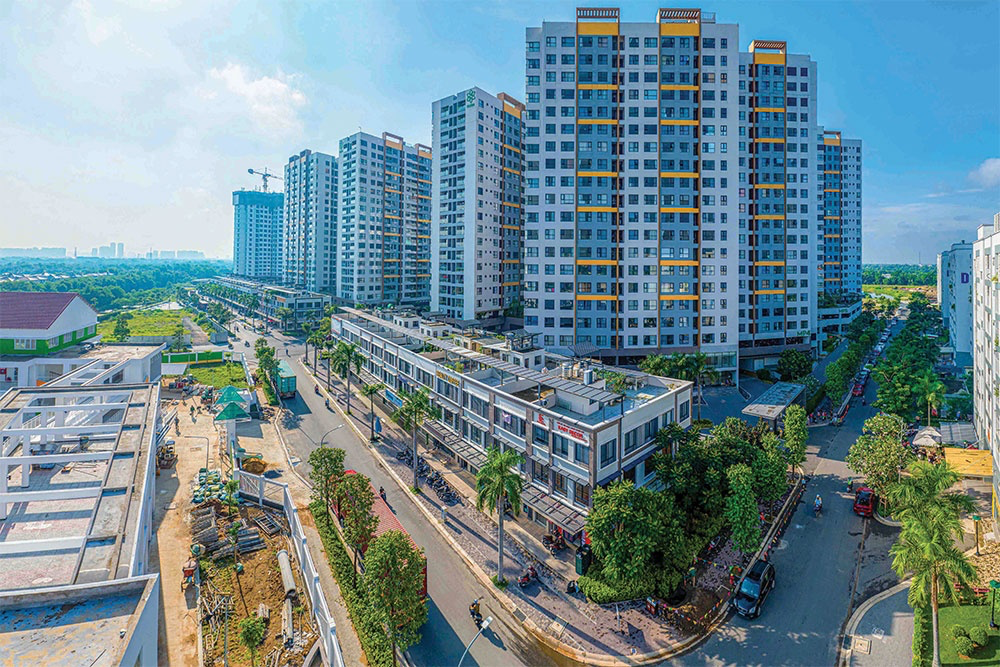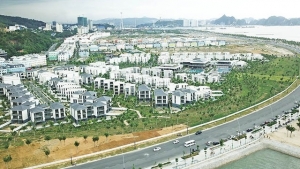Reinventing Vietnam's real estate cash flow
 |
Mid-April saw the simultaneous introduction of home loan programmes with a variety of interest rate incentives ranging from 4.99 to 13.5 per cent per annum. Compared to a year ago, this is considered a very low interest rate in Vietnam.
With the passage of Resolution No.33/NQ-CP this year, many businesses anticipate a further expansion of credit capital for real estate in the near future.
"We are looking forward to new information," said Nguyen Chi Nghia, deputy general director of Dat Xanh Mien Bac Real Estate & Services. "The newly altered interest rate demonstrates the state's timeliness, which is beneficial for businesses. In the immediate future, however, the state must strike a balance to reduce interest rates even further."
In the present economic climate, according to Nghia, the lower the cost of borrowing, the better it is for businesses. According to him, the actual demand in large cities such as Hanoi is high, but purchasers' decisions to purchase a property are "heavily swayed" by the swift rise in real estate prices along with fixed interest rates after the support period, which exceed the majority of people's affordability.
As the Vietnamese government seeks to revitalise the real estate sector, the aforementioned data demonstrates the authorities' efforts to loosen restrictions on home loan activities. According to a report released by Savills on April 11, the average selling price of primary apartments was $2,214 per square metre, which was stable on-quarter while rising 22 per cent on-year. This announcement by Savills coincides with the commitment of numerous banks to provide strong assistance for first-time homebuyers by reducing loan interest rates and down payment requirements.
Also in April, the State Bank of Vietnam (SBV) asked for commercial banks to implement the $5 billion credit programme, which includes loans for social housing, worker housing, renovation and reconstruction of old apartment buildings, with preferential interest rates 1.5-2 per cent lower than average medium and long-term lending rates of state-owned commercial banks; including Agribank, BIDV, Vietcombank, Vietinbank, and non-state commercial banks that are eligible should be eligible to participate in particular credit programmes occasionally.
According to analysts, none of these measures have been successful. Currently, credit institutions continue to extend credit to the real estate industry, despite its rapid expansion and substantial loan balances. At the end of 2022, real estate credit outstanding reached approximately $110 billion, an increase of approximately 24.27 per cent compared to the end of 2021. It became one of the most rapidly expanding industries and accounted for a significant portion of 21.2 per cent of total outstanding loans to the economy, the highest in the past five years.
Outstanding loans for real estate businesses increased by 11.5 per cent, accounting for 31.28 per cent, and outstanding loans for housing needs accounted for 62.1 per cent, according to data released by SBV at the end of February.
Since the beginning of 2022, when Vietnam's real estate market slid gradually into recession, a number of businesses, from large private firms like Novaland to government-backed companies like Housing and Urban Development Corporation (HUD), are experiencing cash flow and debt repayment difficulties. HUD's total assets were $427.5 million as of December 31, according to the company's financial report released on April 10; however, inventory accounted for $237 million, coming from a variety of projects.
The situation has become more dire at the end of the first quarter of this year. Dr. Le Xuan Nghia, a member of the National Monetary and Financial Policy Advisory Council, stated last Wednesday that the real estate market will have a direct impact on the quality of bank assets. Currently, investors borrow money from banks to purchase homes, but with mortgage rates at such low levels, Nghia questions their ability to repay bank loans.
"The real estate market plummeted, and the asset quality of the banking system deteriorated, causing problems. The enormous withdrawal of funds from the Saigon Joint Stock Commercial Bank represents a significant threat to the economy, especially if the lack of financial capacity to manage it spreads to numerous other domains, Nghia said. "The current problem is not only finding a way to recover the market but also preventing major risks to the banking system and financial market."
Nghia added, "The enterprises that are currently ailing are those that do not possess a bank account. There are thousands of real estate companies in Vietnam, but only a handful have institutions capable of restructuring poor debts, issuing new loans, and reversing debt."
Currently, there are two objects to concentrate on, he explained. First, real estate enterprises are experiencing a downturn. These firms, which cannot access new capital from banks, are currently negotiating debt restructuring and debt cancellation. Second, real estate investors who must obtain money from banks are presently subject to high interest rates and are unable to liquidate the purchased property. This object owes the bank, and both the borrower and the lending bank must endure the consequences if there is a problem. "We have not yet reached the brink, but we must act swiftly," said Nghia.
 | Resort real estate set to thrive With an optimistic economic outlook and the anticipation of a tourism rebound, resort real estate is expected to flourish once more. |
 | Removing bottlenecks in real estate market Capital flow, legal bottlenecks, and removing policy obstacles in real estate are the main issues to be discussed by policymakers and experts in a roundtable themed held by Vietnam Investment Review on April 19. |
 | Lenders must embrace responsibility to real estate The banking system is under pressure to assist the real estate market through recent turbulence. Dr. Le Xuan Nghia, member of the National Financial and Monetary Policy Advisory Council, talked with VIR’s Hong Dung about the situation and projections for what is to come. |
What the stars mean:
★ Poor ★ ★ Promising ★★★ Good ★★★★ Very good ★★★★★ Exceptional
Related Contents
Latest News
More News
- Construction firms poised for growth on public investment and capital market support (February 11, 2026 | 11:38)
- Mitsubishi acquires Thuan An 1 residential development from PDR (February 09, 2026 | 08:00)
- Frasers Property and GELEX Infrastructure propose new joint venture (February 07, 2026 | 15:00)
- Sun Group led consortium selected as investor for new urban area (February 06, 2026 | 15:20)
- Vietnam breaks into Top 10 countries and regions for LEED outside the US (February 05, 2026 | 17:56)
- Fairmont opens first Vietnam property in Hanoi (February 04, 2026 | 16:09)
- Real estate investment trusts pivotal for long-term success (February 02, 2026 | 11:09)
- Dong Nai experiences shifting expectations and new industrial cycle (January 28, 2026 | 09:00)
- An Phat 5 Industrial Park targets ESG-driven investors in Hai Phong (January 26, 2026 | 08:30)
- Decree opens incentives for green urban development (January 24, 2026 | 11:18)

 Tag:
Tag:





















 Mobile Version
Mobile Version